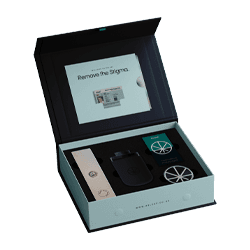Some older research documented in the U.S. National Library of Medicine had already shown that CBD oil may help reduce symptoms of inflammatory bowel disease (IBD) by acting as an anti-inflammatory agent. Today, more recent research supports this idea, with a 2018 study by the Journal of Clinical Investigation demonstrating that cannabinoid-activated endocannabinoids in the gut can prevent inflammation while maintaining homeostasis.
Essentially, CBD oil may help our guts ‘turn off’ inflammation caused by ulcerative colitis. To begin understanding how this works, we must examine how CBD oil interacts with the body’s endocannabinoid system.
Tips for Taking CBD Oil for Ulcerative Colitis
If you want to try treating ulcerative colitis with CBD oil, then it is important to know a little about the different types of CBD oil that are available. These are:
- Full-spectrum CBD
- Broad-spectrum CBD
- CBD isolates
Full-Spectrum CBD
Full-spectrum CBD contains all the natural components found in the original cannabis or hemp plant. These include terpenes, flavonoids, and fatty acids, as well as all the cannabinoids. Full-spectrum CBD oil may also contain trace amounts of THC, but here in the UK, that level must be less than 0.2% THC.
Broad-Spectrum CBD
Broad-spectrum CBD is similar to full-spectrum, as it contains the majority of the compounds in the cannabis plant. Where it differs is that all traces of THC have been removed.
CBD Isolate
CBD isolates have had all undesired cannabinoids removed, along with terpenes and flavonoids. A CBD isolate should be between 97% – 99% pure CBD product.
So, which option is best?
Again, only a doctor that has experience providing medical cannabis treatment options can properly advise you on this. However, many people find that full-spectrum CBD is the most effective as it contains all the natural components found in the original cannabis or hemp plant and therefore provides a more complete range of benefits.
Best practices for taking CBD oil for ulcerative colitis
With studies establishing a clear link between cannabinoids and their potential to help relieve symptoms of ulcerative colitis, it is important to understand the best practices for using CBD oil. You should know the right type of CBD for your condition, as well as the correct starting dosage and incremental increases.
Potential side effects of CBD oil and how to mitigate them
CBD oil is generally well tolerated, but some people may experience side effects, especially at very high doses. Potential side effects include:
- Mood changes
- Decreased appetite
- Drowsiness
- Dry mouth
- Diarrhoea
Side effects can be mitigated by lowering the dose of CBD oil.
How to monitor the effectiveness of CBD oil for treating ulcerative colitis
As the research so far indicates that CBD oil has a noticeably positive effect on the quality of life of people suffering from ulcerative colitis, this is where you should focus your monitoring. Try rating your discomfort and pain on a scale of 1-5 over the course of at least a week prior to beginning CBD oil treatment, and then continue to rate once the CBD oil treatment starts.
Conclusion
With research on IBS from last year discovering that 1 in 123 people in the UK is living with an IBD such as ulcerative colitis or Crohn’s disease, it is important that we educate ourselves on all the possible treatments. While more studies are needed, recent research has shown that CBD oil has real potential to help reduce symptoms in some people suffering from ulcerative colitis.
If you would like to find out more about medicinal cannabis and how it may be able to make a true difference in the severity of your symptoms, we are here to help.
Releaf understands that medical cannabis can be life-changing for many people. That's why we offer tailored monthly packages based on your cannabis prescription, specialist consultations for medical cannabis, and a unique medical cannabis card for protection.



